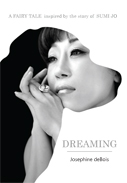
 |
Traffic cop Samuel and his partner Huang are working near Lincoln Center in New York City when they are startled by the sounds of a woman in distress. Sumi Jo, the famous South Korean coloratura soprano, is in the process of being abducted from the street when the two officers come to her rescue. Samuel is instantly taken with Sumi Jo and accompanies her to the hospital, where he stays with her as forensics take samples—a routine procedure in such cases. Samuel senses something magical in Sumi Jo who, because of being traumatized from the attempted kidnapping, leans on Samuel to feel safe. It is the beginning of a connection between the two that will traverse the restrictions of time and place, leading to philosophical questions concerning reality and identity.
Written as a screenplay with in-depth stage directions, this modern-day fairy tale follows Sumi Jo as she travels for performances and Samuel as he begins to learn more about the fascinating and talented woman he rescued. As Samuel learns more about this world-famous singer, he discovers he is more and more intrigued by everything about her. Her calm demeanor, her pitch-perfect voice, her love of animals, her desire to help her beloved country, and the effect these traits have on Samuel all offer insights into the character of both. Sumi Jo possesses the magical ability to transform others through her music, while Samuel possesses an intuitive ability to read others. Though on the surface the two seem worlds apart, it is their inner essence which makes them more alike than not.
Novelist, deBois blurs the lines between reality and fantasy in this fascinating work. Its underlying theme questions the very meaning of identity. As Sumi Jo points out early in the novel, her onstage persona can be perceived by fans to be who she is, yet she is more than her public image. The author delves into this idea of perception through a subplot dealing with the study of genomes. Through characters who have been created in a laboratory specializing in producing specific traits within clones, deBois digs deeper into ideas about personality and psychology. This subplot poses interesting questions concerning the human experience and the role of science in that experience.
At the heart of the novel, however, is the music of Sumi Jo. Each episode of the story ends with a song. The author includes an appendix that lists several of Sumi Jo’s recordings, which readers can access on YouTube to enhance their experience. Inspired by her love and knowledge of music and her admiration of Sumi Jo’s love of and commitment to her native country, deBois creates a work that is as complex as human nature itself. The rise and fall of the action and the elements of fantasy vs. reality produce the tension of great opera. The work is a fine-tuned waltz between philosophical musings and scientific possibilities, harsh realities and dreamlike states.
Readers who enjoy mysteries with a nod toward scientific themes will find much to love in this book. Likewise, those who enjoy works that offer complex ideas and philosophical discussions will find much to ponder here. Perhaps that is the real beauty of this book: it has the capacity to take the reader as far into the worlds of Sumi Jo and Samuel as they dare go.
RECOMMENDED by the US Review